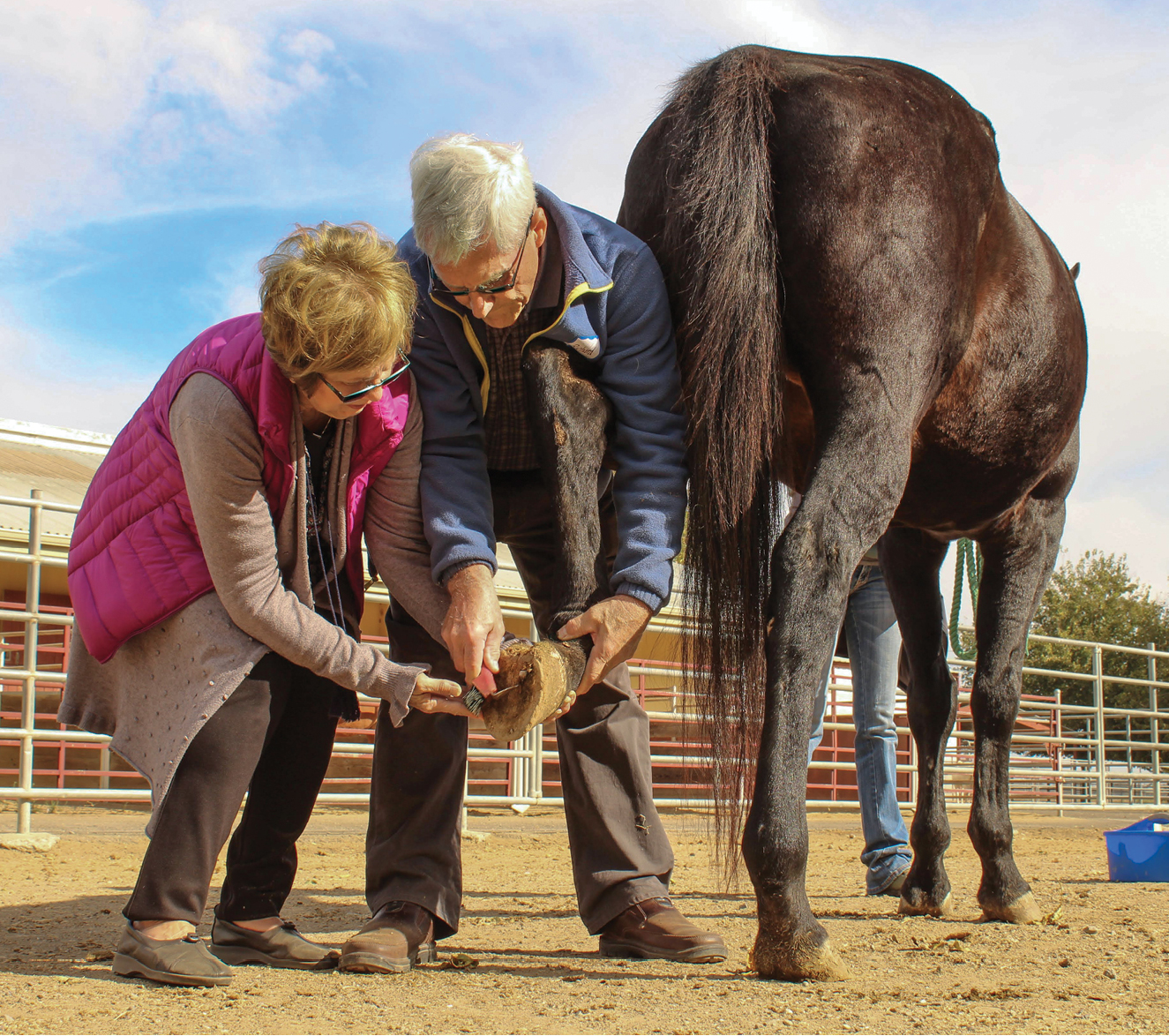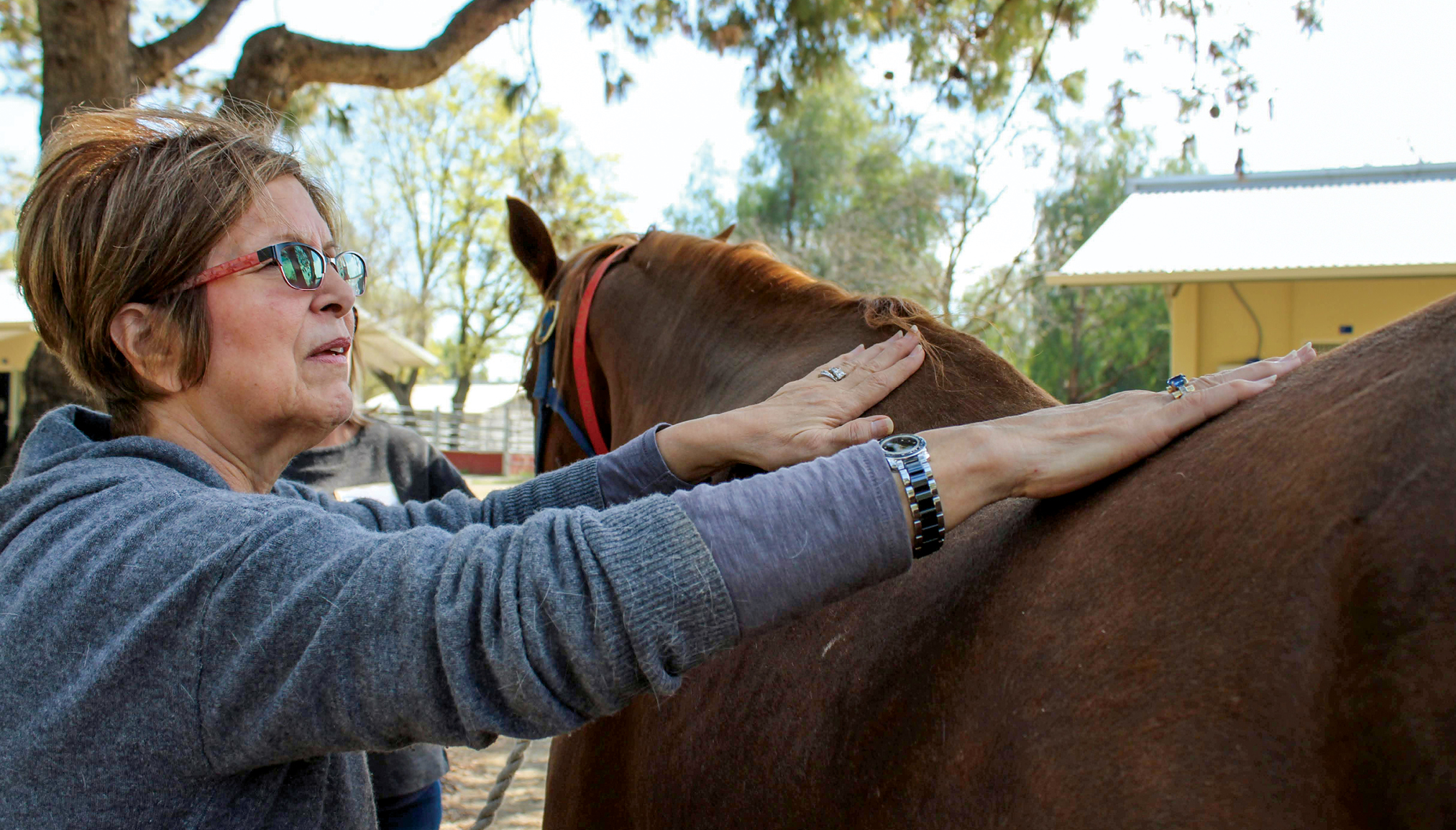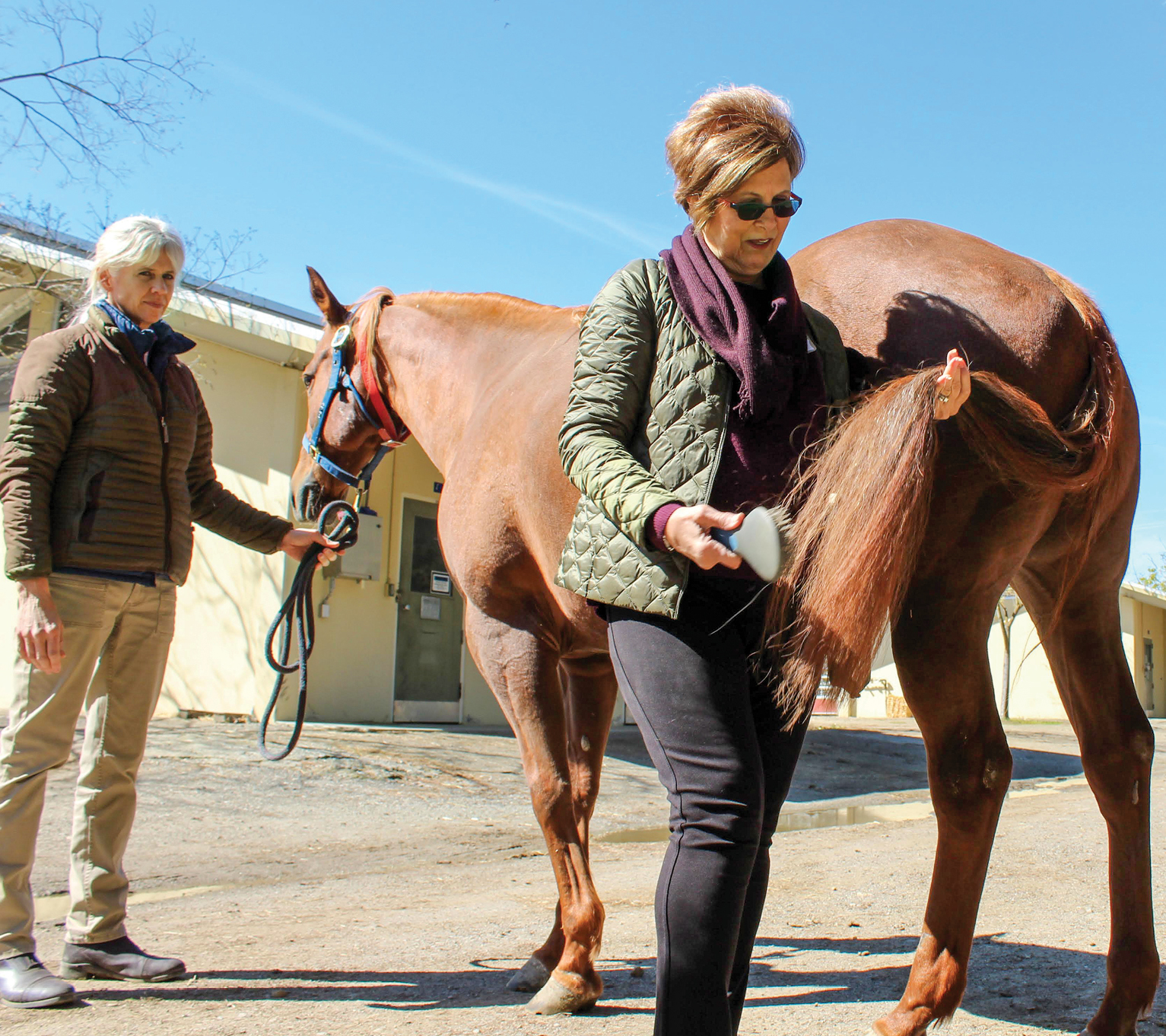Thinking back, Gloria Passarella estimates her husband, Rich, has been in the beginning stages of Alzheimer’s for about 10 years. Subtle changes in his personality, forgetfulness, and less excitement about things that once interested him offered small clues that something was changing.
Every 65 seconds, someone in the United States develops dementia, according to the Alzheimer’s Association. Medical advances have helped doctors diagnose dementia much earlier, but families are often faced with the “now what?” effect.”
After Rich was diagnosed, Gloria was open to trying anything to help her husband, even if it wasn’t conventional or proven. When a friend recommended the Connected Horse, Gloria jumped at the opportunity. The Connected Horse is a non-profit organization founded by lifelong California-based horsewomen Nancy Schier Anzelmo and Paula Hertel. Both have dedicated their professional careers to caring for older adults and memory care residents. The Connected Horse is designed to facilitate the journey people with dementia and their care partners experience after diagnosis.

of togetherness. Photo Provided by Connected Horse
During the past two years, Gloria and Rich have completed three different sessions of the Connected Horse program. They enrolled in a multi-week program that included regular extended trips to the barn and embarked on an experience that has changed their lives and their relationship.
“I’d only been on a horse one time in my life. It was years ago, a ride on the beach in Mexico,” she said. “I’ve been really open to finding alternative care options to benefit Rich, and so we signed up. I never thought I’d benefit from it as much as he would.”
A Devastating Disease
Chances are you know someone—a close family member or friend—who’s been diagnosed with Alzheimer’s or dementia. Nearly six million people in United States are living with the disease, according to the Alzheimer’s Association. That figure will nearly triple in 30 years if current rates continue.
It’s the sixth-leading cause of death among Americans. It kills more people than breast and prostate cancer combined. And it’s the only leading cause of death that essentially has no effective treatment.
“This means that right now most of what we have in terms of treatment is palliative and focused on helping those affected by the disease (patients and their caregivers) maintain a good quality of life and cope as effectively as possible,” said Sarah Tomaszewski Farias, Ph.D., ABPP-CN, a professor in the department of neurology at the University of California, Davis, and principal investor in the Connected Horse Research project at UC Davis School of Medicine, Alzheimer’s Disease Center.
That’s exactly what Anzelmo and Hertel are striving to accomplish. Both women have nearly 30 years’ experience working with seniors, specifically those with memory and cognitive impairments, and have owned horses nearly all their lives. In 2015, they founded the Connected Horse a nonprofit organization focused on equine-guided services for people living with a dementia diagnosis and their care partners.
The program consists of horse-assisted learning activities and discussion groups for people with memory loss, mild cognitive impairment, and early-stage dementia diagnoses and their care partners. All the work is done from the ground, and participants don’t need prior horse experience.
“We’re not teaching horsemanship,” Hertel said. “We’re teaching folks the importance of non-verbal negotiation and working through a struggle.”
Instead of horsemanship lessons, the sessions start with a sensory walk. This encourages participants to become more aware of what’s around them and orients them with what it’s like to be around and inside a barn. Participants spend time outside, taking deep breaths and focusing on being present in the moment.
“Feeling a sense of connection with the earth is just one tool that I took away from the program. It has helped me stay calm and centered in the middle of a crisis. I’m able to regroup easier with more clarity of mind,” said Gloria.
The therapeutic sessions last a few hours, and the activities progress to an “over the fence” interaction where participants get up close and personal while the horse is still in a stall or paddock. Eventually they move on to grooming and leading. By the end, participants are doing liberty work with a horse in a round pen.
For centuries horses have relied on their abilities to adapt to change, sense their environment, and use the interdependence of the herd to thrive. Connected Horse facilitators bring awareness to these instinctual characteristics while encouraging participants to build their own awareness regarding their somatic and emotional responses, Hertel explained.
“The connections between people and horses have proven to be therapeutic in many populations due to the nonjudgmental, unconditional interactions horses offer to each other and humans,” Anzelmo said. “The human-horse connection is especially powerful as the nonverbal responses and behaviors of horses provide immediate feedback and often act as mirrors to participants to provide clarity, strength, and healing.”

Breaking Boundaries
Alzheimer’s has a considerable impact caregivers. As individuals with dementia become more impaired and require more care and supervision it takes a big toll on the caregiver. Stress, tension, and sometimes resentment at having lost an identity, other than being a caregiver, creep in.
“The disease can really alter the relationship between the person with dementia and their caregiver—most often a spouse or adult child,” said Dr. Tomaszewski Farias.
Typically, research studies and therapy sessions separate the care partner from the person with dementia. Hertel and Anzelmo believe it’s important to keep both individuals together because the disease progression and changing relationship dynamic is a shared journey.
Because both the caregiver and the person with dementia are participants in the Connected Horse program, their ages range from 25 to 94. The caregiver roles vary from a spouse to an adult child to a partner to a sibling to a close friend. Working with the horses erases the hierarchy and puts both the caregiver and the person with dementia on the same playing field.
“All of the titles associated with age and who is who go away with the horse,” Anzelmo said.
For Gloria, the Connected Horse sessions provided a sense of freedom. For the 2½ hours she and Rich interacted with the horses, she didn’t have to worry about his well-being or his safety. As Rich’s disease has progressed, he’s increasingly looked to Gloria to affirm the safety of a situation. As his caregiver, she is increasingly on watch.
“It was a real indulgence and relaxation,” she said. “There was always a facilitator present with each of us, so I didn’t have to always be looking out for situations.”
The sessions also remind the caregiver that it’s okay to find time for themselves, even while providing care for a loved one.
“One gentleman had been a woodworker but put it away because he had become the caretaker for his wife,” Anzelmo said. “Through working with the horses, he realized the importance of having his own life and identity and started looking for a way to fit it back in.”
While the caregiver is learning that he or she doesn’t always have to be protective, the person with dementia is discovering that he or she is still a whole person who’s not labeled by disease. As the disease progresses, an individual is forced to give up independence. Many eventually lose confidence in themselves. The simple act of cleaning out a horse’s hoof activates and restores a person’s feeling of self worth.
One male participant with advanced Alzheimer’s had been a painter before the disease crept in. He spent almost 20 minutes painstakingly cleaning every inch of the hoof.
“Our hypothesis is that it made this individual feel useful again to be able to finish the job,” Anzelmo said. “He touched every part of the horse’s hoof to get the rocks out. It was like he was painting the hoof.”
Healing the Horses
Horses are often considered the healers in these types of therapeutic programs. The emphasis is usually on how much joy the horse brings to a person. But the Connected Horse is different. It’s also giving horses the opportunity to “be healed,” too. Many of the Connected Horse sessions take place at UC Davis using the school-owned horses, most of which are seniors. Claudia Sonder, DVM, Emeritus Director at UC Davis Center for Equine Health helped spearhead the research and has been an advocate for this program and others that support new roles for all horses in the community.
Hertel recalls one horse in particular, a retired roping horse, that didn’t want to be haltered or handled when he first came to the center. After he’d passed his prime in the sport, he’d been ignored. When the center adopted him he was a “grumpy old man.” By the end of the program, he was totally engaged, affectionate, and wanted to interact with the participants.
“These older horses, like senior citizens, are often ‘put out to pasture,’ even though they want to work. It’s such a powerful message that just because they are aging doesn’t mean they don’t have a purpose,” Anzelmo said.
The two horsewomen love that they’re serving two senior populations at once. Both own geriatric horses of their own. Anzelmo owns two geriatric horses, including one over 30. Hertel’s herd of four are all 20-plus. The older horses tend to be quieter and have the perfect temperament for interacting with non-horse people and it gives retired horses a purpose once their competitive careers are over.

“Giving these older horses a job and working with the participants, both care partners and people who have dementia, is part of our goal of erasing the stigma around aging,” Hertel said. “We have a responsibility to look at productivity and place in a different way. Just because a horse or a person can’t do what they once did, they still have a societal place and a value.”
Anzelmo and Hertel are often asked why they’re using horses rather than cats or dogs. Small animals are much easier to manage than horses. The horse-loving duo know that horses’ natural instinct as a prey animals makes them much more in tune with their environment and the people in it.
“Horses are non-judgmental. They just want to connect with the people around them. That sets the tone for the whole workshop,” Hertel said.
As any horse person knows, there’s nothing that can replace the experience of quiet time in the barn.
“It’s all about being one with the horse,” Anzelmo said. “I’ve worked in memory care units for 30 years, and I go to the barn to make sense of the world after work. Practicing presence with my horses helps me to be more present with those with dementia.”
The Future
Until a cure is found, families need access to programs focused on care and support for people living with dementia and their family members. Specifically, non-clinical programs for early-stage and young-onset dementia are few and far between. Anzelmo and Hertel are hoping to change that with the Connected Horse. But they realize the importance of scientific research to back up what horse people already know and love about horses.
“Horse people know the benefits of just being around horses. The medical field is more skeptical until scientific research shows a connection,” Anzelmo said. “We’re collecting important data to support what horse people already know.”
The Connected Horse is more than an experience-based program. The outcomes are being tested through research and scientific study. From 2015 to early 2016, the colleagues and friends concluded phase one of at pilot study at Stanford University in conjunction with its Red Barn Leadership program. The results were promising, although the sample size was small. Quantitative and qualitative indicators showed an overall positive trend in measures of support, burden, stress, and sleep, with a decrease in undesired behaviors and positive increases in communication between the patient and caregiver.
In the fall of 2016, a comparative study was launched at UC Davis School of Medicine, Alzheimer’s Disease Research Center, and School of Veterinary Medicine, Center for Equine Health. Data collection is expected to wrap up in 2019.
“The veterinary and medical school worlds rarely work together,” Hertel said. “This research has built a bridge between both schools.”
The study is in progress so specific data cannot be released at this time, but early findings suggest the results will provide the medical field with information to validate the important role horses can play to help individuals diagnosed with dementia and their family members. This research data helps secure funding for future workshop experiences and may even one day lead to greater recognition in the medical field, perhaps even becoming an approved therapy recognized by insurance companies. Even without the statistics, there’s no doubt the Connected Horse is a life-altering program.
“It was such a gift for Rich and me to share an experience that made us feel connected to one another and to connect with a horse,” Gloria said. “It was an empowering experience. The horses showed us a sense of oneness.”






